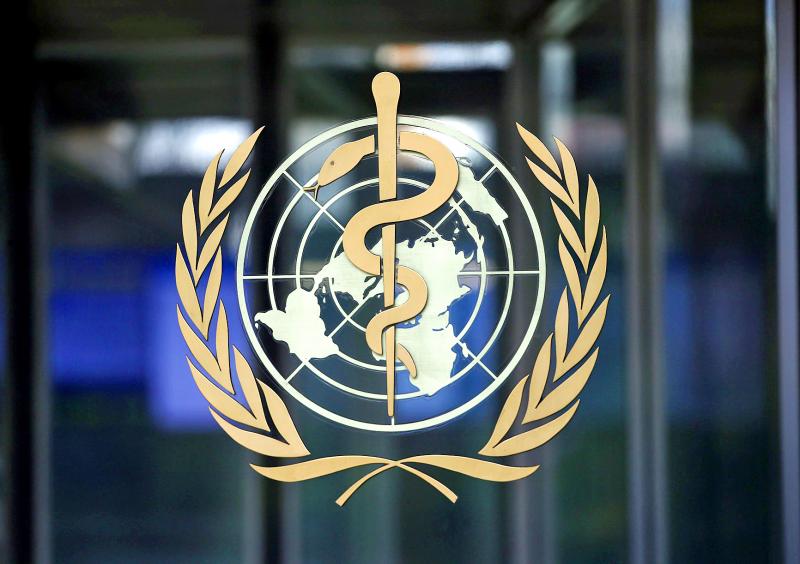A total of 106 lawmakers from seven European countries have sent letters urging the WHO director-general to invite Taiwan to this month’s World Health Assembly (WHA), the Ministry of Foreign Affairs said yesterday.
The WHA, the decisionmaking body of the WHO, held its first-ever virtual annual meeting on May 18 and 19 with a reduced agenda due to travel restrictions caused by the COVID-19 pandemic. The rest of the annual meeting is to take place from Monday to Saturday next week.
In separate letters addressed to WHO Director-General Tedros Adhanom Ghebreyesus, the parliamentarians from the Czech Republic, Estonia, Hungary, Latvia, Lithuania, Poland and Slovakia expressed their strong support for Taiwan’s inclusion in the WHA meeting, especially at a time when the world is struggling with the pandemic, given Taiwan’s exemplary performance in containing its COVID-19 outbreak.

Photo: Reuters
A joint letter addressed to Tedros on Oct. 22 was signed by Waldemar Andzel, chairman of the Polish-Taiwanese Parliamentarian Group; Istvan Tiba, chairman of the Taiwan-Hungarian Parliamentary Friendship Association; Peter Osusky, chairman of the Slovakia-Taiwan Parliamentary Group; and Marek Benda, chairman of the Czech parliament’s Czech Republic-Taiwan Friendship Group.
A separate batch of joint letters sent to Tedros from Oct. 22 to Thursday were signed by Gintaras Steponavicius, chair of the Taiwan Friendship Group of the Lithuanian parliament; Janis Vucans, chairman of the Latvian parliament’s Group for Inter-parliamentary Relations with Taiwan; and Kalle Laanet, chairman of the Estonia-Taiwan Friendship Group, as well as 99 other lawmakers from the three countries, the ministry said.
The ministry thanked the lawmakers for their support and urged the WHO to allow Taiwan’s participation for the benefit of all parties involved.
Denying Taiwan participation at the WHA is a violation of the human rights of the 23 million Taiwanese and is detrimental to global cooperation in the fight against COVID-19, it said.
The ministry would continue to cooperate with like-minded countries to push for Taiwan’s participation in the WHO, it added.
After the People’s Republic of China took China’s seat at the WHO in 1972, Taiwan has not been able to participate in the WHA, except from 2009 to 2016, when it attended as an observer at a time when cross-strait relations were warmer under the then-Chinese Nationalist Party (KMT) government.
Additional reporting by Lu Yi-hsuan

MAKING WAVES: China’s maritime militia could become a nontraditional threat in war, clogging up shipping lanes to prevent US or Japanese intervention, a report said About 1,900 Chinese ships flying flags of convenience and fishing vessels that participated in China’s military exercises around Taiwan last month and in January last year have been listed for monitoring, Coast Guard Administration (CGA) Deputy Director-General Hsieh Ching-chin (謝慶欽) said yesterday. Following amendments to the Commercial Port Act (商港法) and the Law of Ships (船舶法) last month, the CGA can designate possible berthing areas or deny ports of call for vessels suspected of loitering around areas where undersea cables can be accessed, Oceans Affairs Council Minister Kuan Bi-ling (管碧玲) said. The list of suspected ships, originally 300, had risen to about

DAREDEVIL: Honnold said it had always been a dream of his to climb Taipei 101, while a Netflix producer said the skyscraper was ‘a real icon of this country’ US climber Alex Honnold yesterday took on Taiwan’s tallest building, becoming the first person to scale Taipei 101 without a rope, harness or safety net. Hundreds of spectators gathered at the base of the 101-story skyscraper to watch Honnold, 40, embark on his daredevil feat, which was also broadcast live on Netflix. Dressed in a red T-shirt and yellow custom-made climbing shoes, Honnold swiftly moved up the southeast face of the glass and steel building. At one point, he stepped onto a platform midway up to wave down at fans and onlookers who were taking photos. People watching from inside

Japan’s strategic alliance with the US would collapse if Tokyo were to turn away from a conflict in Taiwan, Japanese Prime Minister Sanae Takaichi said yesterday, but distanced herself from previous comments that suggested a possible military response in such an event. Takaichi expressed her latest views on a nationally broadcast TV program late on Monday, where an opposition party leader criticized her for igniting tensions with China with the earlier remarks. Ties between Japan and China have sunk to the worst level in years after Takaichi said in November that a hypothetical Chinese attack on Taiwan could bring about a Japanese

The WHO ignored early COVID-19 warnings from Taiwan, US Deputy Secretary of Health and Human Services Jim O’Neill said on Friday, as part of justification for Washington withdrawing from the global health body. US Secretary of State Marco Rubio on Thursday said that the US was pulling out of the UN agency, as it failed to fulfill its responsibilities during the COVID-19 pandemic. The WHO “ignored early COVID warnings from Taiwan in 2019 by pretending Taiwan did not exist, O’Neill wrote on X on Friday, Taiwan time. “It ignored rigorous science and promoted lockdowns.” The US will “continue international coordination on infectious